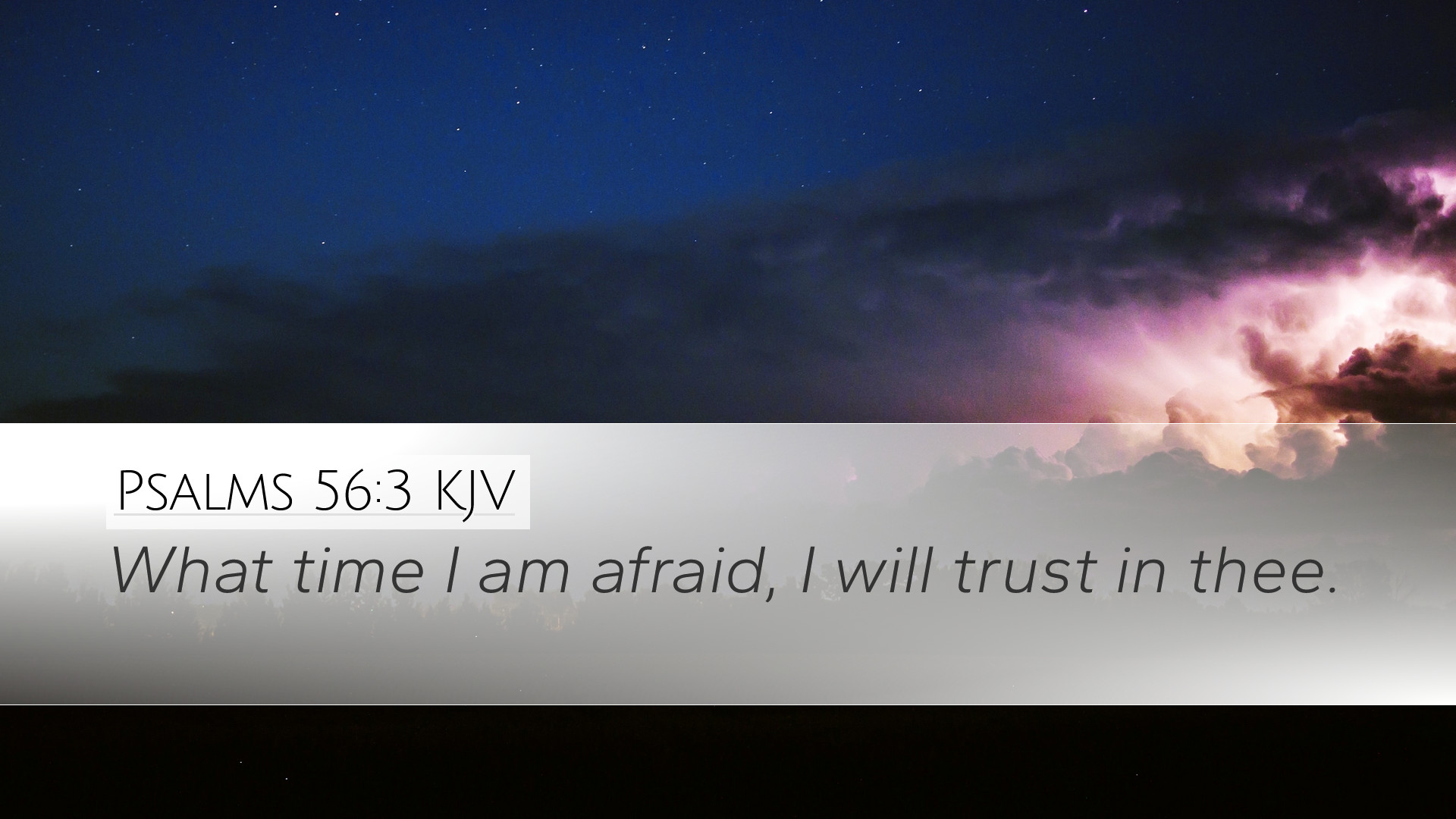Psalms 56:3 - Commentary Summary
Verse: "Whenever I am afraid, I will trust in You." (Psalms 56:3, NKJV)
Introduction
This verse from the Book of Psalms encapsulates a profound declaration of faith amidst fear and uncertainty. It serves as a reminder that trust in God provides refuge and strength regardless of the circumstances. In the writings of esteemed commentators such as Matthew Henry, Albert Barnes, and Adam Clarke, we find rich insights that enhance our understanding of this scripture.
Context of Psalms 56
Psalms 56 is attributed to David, penned during a time of great distress when he was captured by the Philistines in Gath. This context is crucial as it frames the sentiment expressed in verse 3, which reflects David's earnest plea for God’s protection amidst overwhelming fears.
Fear and Trust
In this verse, we observe the duality of human experience: fear and trust. David does not deny his fear; rather, he acknowledges it and counters it with faith. Matthew Henry elaborates on this by stating that the acknowledgment of fear is the first step towards overcoming it through faith. He emphasizes that feeling afraid is a common human reaction, but it is what we do in response to that fear that defines our spiritual maturity.
Faith in Action
Albert Barnes notes that the term "trust" signifies a continual act of placing confidence in God's character and promises. This trust is not a fleeting sentiment but a deliberate choice made during moments of crisis. David exemplifies a proactive response to fear; instead of succumbing to anxiety, he redirects his focus to God, illustrating the necessity of nurturing our faith even when circumstances invite doubt.
The Nature of God’s Protection
Adam Clarke points out that David's trust is rooted in his understanding of God's nature. He perceives God not merely as a distant deity but as an ever-present help in times of trouble. Clarke elaborates that this trust is grounded in God's past deliverances, portraying a believer’s history with God as a foundation for present and future reliance. It is vital for believers to recall God's faithfulness in their lives, particularly when facing new challenges.
Theological Implications
The implications of this verse extend beyond individual struggles with fear; it invites a theological reflection on the character of God and contrasts human vulnerability with divine reliability. The act of trusting God amidst fears can serve as a testimony to others regarding God’s sustaining grace.
Community of Believers
This verse also highlights the communal aspect of faith. While David speaks personally, the shared knowledge of God’s faithfulness within a community can bolster individual trust. It empowers congregations to support one another in times of fear, embodying the truth of Philippians 4:6-7, where believers are encouraged to bring their anxious thoughts to God.
Practical Application
Psalms 56:3 serves as a practical guide for believers today on how to navigate fear. Here are several applications based on the insights of the commentators:
- Acknowledge Fears: Just as David did, believers should not suppress their fears but recognize and name them. This honesty lays the groundwork for dealing with anxiety through spiritual means.
- Engage in Prayer: Trusting in God begins with prayer. Regularly conversing with God about fears and seeking His guidance reinforces the believer's reliance on Him.
- Reflect on God’s Faithfulness: Cultivating a habit of remembering past experiences of God’s deliverance can bolster current faith and alleviate fears.
- Create Support Structures: Building a community of faith where believers can share their struggles fosters an environment where mutual encouragement flourishes.
Conclusion
Psalms 56:3 profoundly affirms that while fear is an inevitable part of the human experience, it does not have to govern our lives. It calls believers to declare their trust in God actively, inviting His peace and protection amidst tumultuous situations. The insights from Matthew Henry, Albert Barnes, and Adam Clarke encourage deeper contemplation of God’s character and personal faith journeys, challenging us to embody trust in our daily lives. As we reflect on this verse, may we choose faith over fear and inspire others to do the same.


